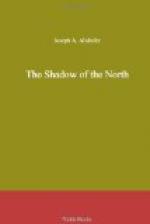CHAPTER
I. The Onondaga
II. The ambush
III. The signal
IV. The perilous path
V. The runner
VI. The return
VII. The red weapon
VIII. Waraiyageh
IX. The Watcher
X. The port
X1. The play
XII. The slaver
XIII. The meeting
XIV. The Virginia capital
XV. The forest fight
The shadow of the
north
CHAPTER I
THE ONONDAGA
Tayoga, of the Clan of the Bear, of the nation Onondaga, of the great League of the Hodenosaunee, advanced with utmost caution through a forest, so thick with undergrowth that it hid all objects twenty yards away. He was not armed with a rifle, but carried instead a heavy bow, while a quiver full of arrows hung over his shoulder. He wore less clothing than when he was in the white man’s school at Albany, his arms and shoulders being bare, though not painted.
The young Indian’s aspect, too, had changed. The great struggle between English and French, drawing with it the whole North American wilderness, had begun and, although the fifty sachems still sought to hold the Six Nations neutral, many of their bravest warriors were already serving with the Americans and English, ranging the forest as scouts and guides and skirmishers, bringing to the campaign an unrivaled skill, and a faith sealed by the long alliance.
Tayoga had thrown himself into the war heart and soul. Nothing could diminish by a hair his hostility to the French and the tribes allied with them. The deeds of Champlain and Frontenac were but of yesterday, and the nation to which they belonged could never be a friend of the Hodenosaunee. He trusted the Americans and the English, but his chief devotion, by the decree of nature was for his own people, and now, that fighting in the forest had occurred between the rival nations, he shed more of the white ways and became a true son of the wilderness, seeing as red men saw and thinking as red men thought.
He was bent over a little, as he walked slowly among the bushes, in the position of one poised for instant flight or pursuit as the need might be. His eyes, black and piercing, ranged about incessantly, nothing escaping a vision so keen and trained so thoroughly that he not only heard everything passing in the wilderness, but he knew the nature of the sound, and what had made it.
The kindly look that distinguished Tayoga in repose had disappeared. Unnumbered generations were speaking in him now, and the Indian, often so gentle in peace, had become his usual self, stern and unrelenting in war. His strong sharp chin was thrust forward. His cheek bones seemed to be a little higher. His tread was so light that the grass scarcely bent before his moccasins, and no leaves rustled. He was in every respect the wilderness hunter and warrior, fitted perfectly by the Supreme Hand into his setting, and if an enemy appeared now he would fight as his people had fought for centuries, and the customs and feelings of the new races that had come across the ocean would be nothing to him.




